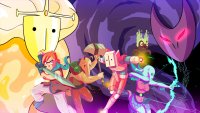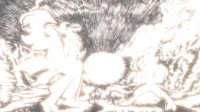
In MMORPGs(Massively Multiplayer Online Role-Playing Game), players make all different kinds of communities, big or small, with other users who share the same goals and traits, then take collective actions within the game. Their behavior and the incidents that they face are no different from the ones a real life society deals with. The size of some communities are even larger than the one of a country with relatively low population.
If the game is a society, the developer is the government. They observe the actions of the users, build a system and rules to be followed, and also penalize corrupt users who may threaten the community. Their absolute authority as the Creator determine how the users play the game and even their fate in certain occasions. Users who are discontent with these policies end up quitting the game entirely.
The formation of an economy is inevitable within a society. In an effort to control the economic behavior of their users, the developers build diverse trading systems such as the 1:1 trades, auction markets, trading markets and so on. Developers also sell the items in exchange of cash, and control the sources where the users can get the currency from including the amount users can own.
The trading system is fine as long as the game assets keep circulating within the game world. If anything goes wrong, the developer will just come up with a solution to fix the problem. In the beginning, many developers designed systems without taking into consideration the encashment of the game assets. However, the game assets started to gain actual value in the real world, which will eventually generate issues. To help you better understand this theory, let’s take a look at an example. How about the widely-known and successful franchise World of Warcraft? The IP that sparkled the birth of Ethereum. Of course, the economic system wasn’t the reason behind Vitalik leaving WoW.
World of Warcraft was facing a gold inflation issue due to many reasons including the ‘Gold party’. Their approach to fix the problem was the WoW token system. But, this system was still founded under the unbeatable authority of the developer. Thus it’s hard to say it was a reliable or stable solution as an insider could yet manipulate the system or the developer change the market price intentionally.
The WoW currency unit is “Gold” which can be earned when a user completes a quest or terminates a monster. The gold is used to buy items from an NPC or to trade with the other users. But the ‘pricey equipment’ that users earned on a raid was not allowed to be traded because then the item would become part of the character. Besides, one has to spend significant amount of time and effort to earn this kind of equipment and there is no guarantee s/he will get it. There was gold trade back in those days, but it didn’t affect the game ecosystem noticeably. In fact, users were mostly interested in resources that require a large amount of time to produce, such as game accounts with multiple characters that have reached extremely high levels.
Not happy with the system, users came up with an unofficial rule called ‘Gold Party’. The members of a raid run an item auction with gold, and the winner would get the item. After the raids, the gold that is collected during the auctions is split equally to all raid members. In the beginning, some were against this idea claiming it makes the game less fun, however it was a system that was fulfilling the needs of both the users who want the item, and the ones who want the gold. So, this system gains popularity and ends up being integrated as a part of WoW.
Therefore, the gold value in WoW starts soaring and so does its demand among the users. The game system offers gold through a very limited number of ways, so the cash value of gold is set at a remarkably high price. But this trend changes abruptly when people start hearing rumors that gold can be cashed out and this is how the ‘Bot’, people who play solely with the purpose of getting gold, is born.
As Gold value plummets, one expects the prices to sky rocket, but it didn’t happen. Bots were taking control not only of the gold but also the materials and items produced in the game. On top of that, they attempted to corner the market, and also manipulate the prices. Other users who witness this phenomenon learn quickly and join the club, and the WoW economy will now depend on them. The price of the equipment required to achieve the final goal of the game increases insanely, but the amount of gold a player can get through gameplay doesn’t differ much from the time the game was released. So new game users purchase gold with cash or quit the game unsatisfied. This vicious cycle continues to grow until the grey market run by cash trade takes over the WoW economy. If this doesn’t stop, the cost for joining the game increases, the new users quit the game as well as the existing users, and ultimately the game will come to an end. Economy is a vital factor that can define the destiny of a game, but at the same time the way it’s designed is so vulnerable that it can be collapsed due to external factors. Sadly, it makes it difficult for the developer to interfere as cash value is involved.
In order to solve this problem, Blizzard has created the ‘WoW Token’. They sell WoW Tokens equivalent to 1 month of subscription. Users can purchase the token and sell it at the auction then exchange for gold. The token value is based on the total amount of gold circulating in the game server. Users who buy token at the auction can extend their subscription for 1 month. In other words, the token seller is making the payment of the 30 day subscription on behalf of the buyer while the gold trade is considered legitimate. They claim this is to be a ‘safe game’ authorized by the developer and encourage users to buy the token with confidence. They are hoping that the demand for gold from bots will decrease in the grey market, and that the game economy will stabilize allowing the developer to get back its economic power.
However, the WoW token is not perfect because the token issuing is managed by the developer who has supreme authority on the game system. Users can do nothing but trust the developers and use their service. But what if the developer start manipulating the token:gold exchange rate and the token price with unethical intentions? The user will lose everything, the time and effort invested in the game, and also the opportunity of cashing out. It’s not easy for the users to find the game suddenly reliable due to the introduction of the WoW token. It wasn’t related to the economy, but Vitalik experienced that his characters’ skills changed based on the decisions made by Blizzard, and believed thinking a centralized system can’t be trusted. It became the fundamentals of Ethereum.
How can we fix this instability? Create a security team composed by people with the highest level of integrity and competency? But can we really trust these people? How about a guarantor? And the guarantor can be trusted? Of course the developer data can’t be manipulated so easily; their data must be stored securely.
Let’s assume the WoW token is a currency in the Blockchain system.
Users can use gold to produce WoW token. The token can be traded between users. The trade record is publicly shared among all users. WoW token can be exchanged back to gold or to a game good from another game from Blizzard. The excess gold can be exchanged to cash or another item preventing inflation from happening. Users can cash out the time, effort and their abilities, and count with a reliable source for obtaining gold. Developers can charge a transaction fee on the trades between users, and also stop players from leaving the game to switch to the competitor; all great benefits for the developer. Under this system, the user will be able to trust the transactions, and enjoy the game more. The developer will be able to reduce their cost to solve security and economic issues, and invest their resources in creating better game content.
My idea is just an example that is based on Wow token, so it doesn’t cover all the unexpected events that can come up. But if the external factors of the game cannot be avoided completely, then Blockchain technology could have some answers. Today, games such as EVE Online that allow cashing out game assets are already available in the market. The terms of service of a game can no longer dictate the ownership rights on its assets. For now, the idea of the developer having indisputable control over the game, regardless whether their intentions are benign or not, seems to be somewhat outdated.








